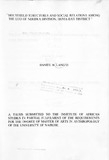| dc.description.abstract | This thesis concerns itself with the mutual communication
between people and their environment; that people influence and are
influenced by the built surrounding. The basic argument in the thesis
is that several factors influence human behaviour and among these are
the physical structures that people construct, the space that these
structures occupy and the arrangement of these structures. The ideal
typical Luo homestead in Ndhiwa Division, Homabay District is the
basis for the thesis.
The population in this study was the typical indigenous
polygynous Luo homestead. The homestead was chosen because it was
the one most likely to provide answers to the questions raised by the
hypotheses in the study.
The basic anthropological data collection techniques were
ernployed in this study which is a qualitative and descriptive one. Also
employed was the stratified sampling technique for use in the
questionnaire as supplementary to the anthropological data collection
techniques.
The manner in which a people construct buildings, perceive and
behave in them, and accommodate change is firmly intertwined with
their worldview such that any development oriented adjustment can
effectively work only if the people themselves see it as useful in
improving their day to day life.
Practical physical considerations play an important role in
determining choice of site among the Luo, though other factors also
have some influence. Building materials depend upon availability and
suitability.
In a typical Luo homestead, the design and layout of each
structure is contributory to the proper functioning of the total
homestead system. A structure ceases to exist once its functions are
lost or incorporated into another. Those structures that have functions
useful to the system continue to persist in establishment and form, with
adjustments to fit in with their expanding functions.
Traditions dictate certain norms of behaviour in society,
manifested in material culture. Certain spaces have more value than
others. Regarding buildings, those structures built on valued spaces
are relatively more important. Consequently, the owners of the spaces
exercise more influence over others. This, in turn, shapes behaviour,
makes certain responses and actions possible and thereby shapes social
relationships within the limits customs permit. | en |

